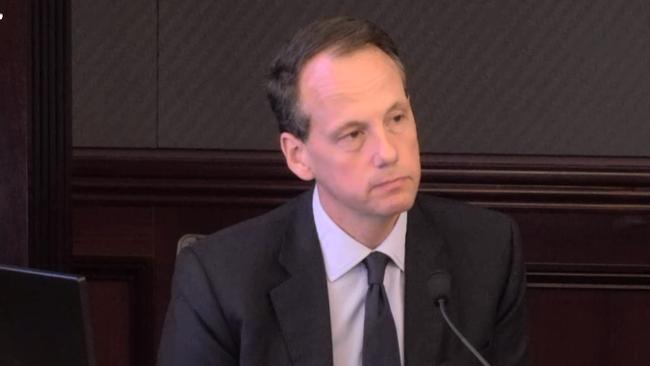Banking royal commission: ASIC boss flags tougher enforcement policy as he fends off criticism
ASIC chairman James Shipton has told the bank inquiry ASIC plans to release a beefed-up enforcement policy in December.

Australian Securities and Investments Commission chairman James Shipton says he will publicly release a tougher enforcement policy in December, as the regulator fends off criticism and seeks to accelerate a program of legal action.
Mr Shipton, appearing on day four of the commission’s policy round, said work had been brought forward and he wanted a new enforcement strategy released “as soon as practicable” and most likely in mid-December.
“Please be assured we are working as quickly as we possibly can to get it done as soon as possible,” he told the commission, under fierce questioning.
On the new enforcement policy, Mr Shipton said ASIC would become more willing to take quicker action and would prioritise cases where there had been “disregard or disdain” by financial institutions of the regulation or the law.
Review highlights of today’s action over at our live blog
“There is certainly room for improvement … to the timeliness of conducting and starting investigations and commencing legal proceedings,” he said.
Mr Shipton admitted to senior counsel assisting Rowena Orr QC, that ASIC needed to do a “better job” on both decision making and processes and being clear on strategy and priorities.
His comments come after Kenneth Hayne’s interim report was critical of ASIC and the prudential regulator for taking a light-handed approach to enforcement and legal action in the banking and wealth sector.

Mr Shipton also talked about extra government funding of $26.2 million — announced in August — being largely used for a deep dive into the wealth management sector, including the big four banks, AMP and Macquarie.
Ms Orr pushed Mr Shipton to concede that much of that funding boost would look at cases relating to the royal commission, some of which ASIC had not been investigating.
He also came under fire about ASIC not taking firm action against National Australia Bank’s controversial home loan introducer program, which provided payments for mortgage referrals, despite the regulator knowing about it for two years.
On the wealth management inquiry, Mr Shipton said ASIC was recruiting up to 40 staff to help on this project, including IT specialists and forensic accountants.
More broadly though, he is still of the view that ASIC is under resourced relative to regulators in other markets.
“In my own experience I believe that ASIC is under resourced compared to some of our peers globally,” Mr Shipton, who took the helm at ASIC nine months ago, said.
He said ASIC received 2000 breach reports a year, 12,000 complaints and employed 240 staff in enforcement. The regulator has also experienced a 40 per cent to 50 per cent jump in breach reports in the last few months.
ASIC has to make “real time decisions” on which matters it can investigate, Mr Shipton added.
“We have less staff in enforcement, of that 240, than there are sworn police officers in the Australian Capital Territory. In fact, there are almost three times as many sworn police officers in the ACT than we have staff members in enforcement.
“The tens of thousands of complaints we receive, the number of resources that we have ... means we have to make very difficult choices. So I don’t think that’s a failure.”





To join the conversation, please log in. Don't have an account? Register
Join the conversation, you are commenting as Logout